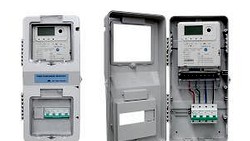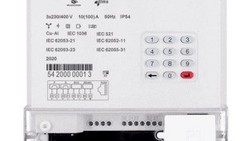Smart grids are a new generation of electric power grids that use digital technology to improve the reliability, efficiency, and sustainability of the grid. Smart grids can help to reduce outages, improve power quality, and enable new services such as demand-side management and renewable energy integration.
Benefits of Smart Grids
- Improved reliability:
Smart grids can help to reduce outages by providing utilities with real-time data on the grid. This data can be used to identify and address problems before they cause outages. The estimated increase in reliability is up to 30 %. - Increased efficiency:
Smart grids can help to improve the efficiency of the grid by enabling demand-side management and renewable energy integration. Demand-side management is a program that encourages customers to use less energy during peak demand periods. Renewable energy integration is the process of connecting renewable energy sources, such as solar and wind power, to the grid. Here is a potential of about 20 %. - Improved security:
Smart grids can help to improve the security of the grid by providing utilities with real-time data on the grid. This data can be used to identify and address security threats before they cause outages.

What about Cost Reduction?
In fact, smart grids have the potential to reduce costs in the long run. For utilities, smart grids can help to reduce the cost of operations and maintenance. For customers, smart grids can help to reduce energy bills by providing them with information on their energy usage and by enabling them to participate in demand-side management programs.
Often ignored is, that there are some additional costs associated with smart grids, including the need to replace components such as smart meters after a certain period of time, typically around 20 years. This can add to the overall cost of implementing and maintaining a smart grid system.
Additionally, smart grid projects often require financing, which can involve interest payments and other costs associated with borrowing money. However, it's important to note that these costs must be factored into the overall cost-benefit analysis of smart grid projects.
Despite these additional costs, the benefits of smart grids, such as increased efficiency, reliability, and integration of renewable energy sources, are expected to outweigh the costs in the long run. Furthermore, advancements in technology are likely to reduce the costs of components over time, while refinancing strategies can help to manage the costs associated with financing smart grid projects.
How Smart Grids are Financed in Different Countries
Deploying smart grids can incur significant upfront costs due to the requirement of various new technologies such as smart meters, communication networks, and control systems. Moreover, the benefits of smart grids are not always immediately apparent, and it may take several years before the full advantages of the technology are realized. This delay in realizing the benefits of smart grids can make it challenging for utilities to justify the initial cost of deployment.
The financing of smart grids will vary depending on the specific circumstances of each country or region. However, there are some general trends that I have observed:
In developed countries, utilities are typically the primary financiers of smart grids. This is because utilities have a strong incentive to invest in smart grids, as they can improve the efficiency and reliability of the grid and reduce costs.
In developing countries, governments are often the primary financiers of smart grids. This is because governments have a strong interest in improving the reliability of the grid and providing access to electricity to underserved populations.
Private investors are also playing an increasingly important role in the financing of smart grids. This is because private investors are attracted to the long-term revenue streams that can be generated by smart grids.
The World Bank is committed to supporting the deployment of smart grids as part of its efforts to promote sustainable and inclusive economic development around the world. For example, the World Bank has provided financing for a smart grid project in Mexico, which aims to modernize the country's electricity grid by implementing new technologies such as advanced metering infrastructure and distribution automation. The World Bank has also provided support for a smart grid project in India, which seeks to integrate renewable energy sources into the grid and improve the efficiency and reliability of the power supply.
The European Union (EU) has made significant investments in smart grid projects as part of its efforts to modernize and decarbonize the energy sector. The EU has funded various smart grid projects through its research and innovation program, Horizon 2020, and its funding program for energy infrastructure, Connecting Europe Facility (CEF). Examples are a smart grid project in Denmark, which aims to develop an intelligent energy management system for households, and a smart grid project in Italy, which seeks to improve the efficiency and reliability of the power supply.
China's Belt and Road Initiative (BRI 一带一路) includes investments in smart grid projects as part of its broader efforts to promote sustainable infrastructure development. The BRI seeks to promote economic development and cooperation between China and participating countries through investments in various sectors, including energy.
China has made significant investments in smart grid projects, both domestically and in countries participating in the BRI. For example, China has implemented several smart grid pilot projects in its own territory, such as the State Grid Corporation of China's (SGCC) "Strong Smart Grid" initiative, which seeks to develop an intelligent, flexible, and efficient power grid.
In addition, China has funded smart grid projects in BRI participating countries, such as Pakistan and Kazakhstan. For example, China has provided funding for a smart grid project in Pakistan, which seeks to improve the efficiency and reliability of the power supply and support the integration of renewable energy sources. China has also funded a smart grid project in Kazakhstan, which aims to develop an intelligent energy management system for households and businesses.
Key Factors for Financing
- The regulatory environment
The regulatory environment in each country will play a role in determining how smart grids are financed. For example, some countries may provide financial incentives to utilities that deploy smart grids, while others may not. - The level of government support
The level of government support for smart grids will also vary from country to country. Some governments may provide financial assistance to utilities for the deployment of smart grids, while others may not. - The financial resources of utilities
The financial resources of utilities will also play a role in determining how smart grids are financed. Utilities with more financial resources may be more likely to self-finance the deployment of smart grids, while utilities with fewer financial resources may be more likely to seek financial assistance from governments or private investors.
Takeaway
The implementation of smart grid technology has the potential to bring significant benefits to the energy sector, including improved energy efficiency, increased reliability and quality of power supply, and the integration of renewable energy sources.
To successfully implement smart grids, there is a need for collaboration and cooperation among various stakeholders, including utilities, policymakers, regulators, and consumers. The deployment of smart grids also requires careful planning, stakeholder engagement, and consideration of the unique characteristics and needs of different regions and countries.
Our team of experts can provide you with innovative and reliable software and hardware solutions that support the integration of renewable energy sources, improve energy efficiency, and enhance grid reliability and resiliency. We are dedicated to working closely with you to understand your unique needs and develop tailored solutions that meet your specific requirements.
Whether you're a utility company or a government agency, we have the expertise and experience to help you achieve your smart grid goals. Contact us today to learn more about how we can contribute to your successful deployment of smart grids.
Editor's note: This article was originally published in April 2023 and has been updated for comprehensiveness.





All comments are moderated before being published. Inappropriate or off-topic comments may not be approved.